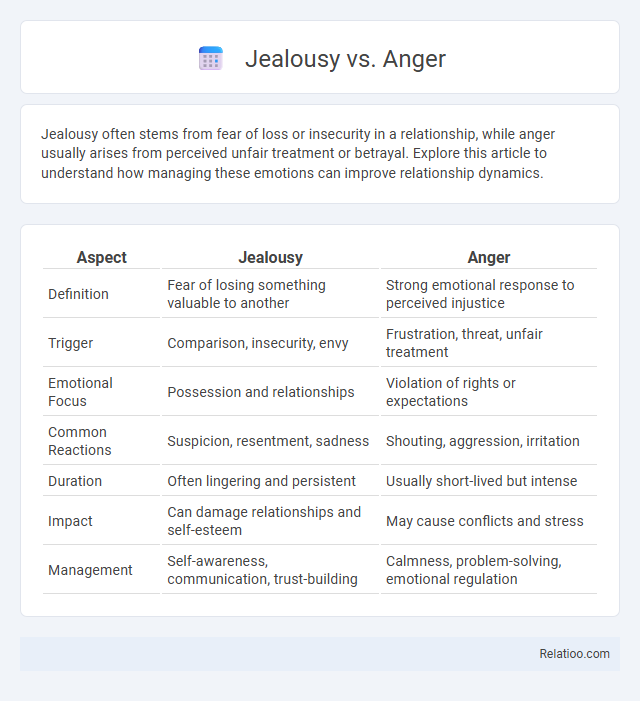Jealousy often stems from fear of loss or insecurity in a relationship, while anger usually arises from perceived unfair treatment or betrayal. Explore this article to understand how managing these emotions can improve relationship dynamics.
Table of Comparison
| Aspect | Jealousy | Anger |
|---|---|---|
| Definition | Fear of losing something valuable to another | Strong emotional response to perceived injustice |
| Trigger | Comparison, insecurity, envy | Frustration, threat, unfair treatment |
| Emotional Focus | Possession and relationships | Violation of rights or expectations |
| Common Reactions | Suspicion, resentment, sadness | Shouting, aggression, irritation |
| Duration | Often lingering and persistent | Usually short-lived but intense |
| Impact | Can damage relationships and self-esteem | May cause conflicts and stress |
| Management | Self-awareness, communication, trust-building | Calmness, problem-solving, emotional regulation |
Understanding Jealousy: Definition and Roots
Jealousy is a complex emotional response triggered by perceived threats to a valued relationship, often rooted in insecurity, fear of loss, and low self-esteem. Unlike anger, which is a reaction to perceived injustice or frustration, jealousy intertwines fear and possessiveness, leading to emotional outbursts when fears become overwhelming. Understanding jealousy requires exploring its psychological origins, such as attachment styles and past experiences that shape how individuals perceive and react to relational threats.
Exploring Anger: Causes and Manifestations
Anger originates from perceived threats, frustrations, or injustices, triggering physiological responses such as increased heart rate and adrenaline release. It manifests through behaviors like yelling, aggression, or withdrawal, often serving as a defensive mechanism to regain control in stressful situations. Understanding the root causes of anger--including unmet needs, past trauma, or cognitive distortions--helps manage emotional outbursts effectively and reduces their intensity.
Key Differences Between Jealousy and Anger
Jealousy involves feelings of insecurity and fear of losing something valuable, often linked to relationships or possessions, while anger is an emotional response to perceived threats or injustices. Unlike anger, which can be outwardly expressed and reactive, jealousy tends to be more inward and reflective, sometimes leading to emotional outbursts if not managed. Understanding these key differences helps you recognize and address your emotional triggers more effectively.
Psychological Triggers of Jealousy
Jealousy arises from psychological triggers such as perceived threats to self-worth, fear of loss, and comparison with others, often rooted in unresolved insecurities and attachment issues. Unlike anger, which is typically a response to external provocations or injustices, jealousy is an internal emotional state driven by anxiety over relationships and personal value. Emotional outbursts can result from intense jealousy when these triggers overwhelm coping mechanisms, leading to impulsive or irrational behaviors.
Emotional Triggers Behind Anger
Emotional triggers behind anger often stem from feelings of jealousy or perceived threats to personal values, relationships, or self-esteem. Your body's response to these triggers can escalate into emotional outbursts, which are intense and uncontrolled expressions of anger. Understanding these underlying triggers helps in managing reactions and preventing damaging emotional explosions.
The Impact of Jealousy on Relationships
Jealousy often triggers emotional outbursts that strain trust and communication within relationships, leading to misunderstandings and increased conflict. Unlike anger, which can be a direct response to specific events, jealousy stems from insecurity and fear of loss, undermining emotional intimacy and stability. Persistent jealousy disrupts relationship dynamics by fostering resentment and emotional distance, ultimately threatening long-term connection and satisfaction.
Consequences of Anger in Everyday Life
Anger can severely impact your relationships, leading to misunderstandings, trust issues, and communication breakdowns, which can isolate you from loved ones. Uncontrolled emotional outbursts often result in increased stress and health problems such as hypertension and weakened immune response. Unlike jealousy, which may cause internal turmoil, anger expressed without restraint has more immediate and visible consequences, affecting both your personal and professional life.
Managing Jealousy: Tips and Strategies
Managing jealousy effectively involves recognizing its triggers and practicing self-awareness to prevent emotional escalation. You can implement strategies such as mindfulness meditation, journaling your feelings, and communicating openly to transform jealousy into personal growth. Developing emotional regulation skills helps reduce jealousy-driven anger and minimizes intense emotional outbursts, promoting healthier relationships.
Healthy Ways to Cope with Anger
Anger arises as a natural emotional response distinct from jealousy and emotional outbursts, which often involve more complex feelings of envy and loss of control. You can manage anger effectively through healthy coping strategies such as deep breathing, engaging in physical activity, and practicing mindfulness to maintain emotional balance. These techniques help prevent destructive behavior and promote emotional resilience.
Choosing Emotional Growth Over Conflict
Jealousy, anger, and emotional outbursts often trigger reactive behaviors that hinder personal growth and damage relationships. Choosing emotional growth involves recognizing these feelings as opportunities for self-awareness and practicing mindfulness to respond thoughtfully rather than react impulsively. By managing your emotions constructively, you foster healthier interactions and build resilience against future conflicts.

Infographic: Jealousy vs Anger
 relatioo.com
relatioo.com